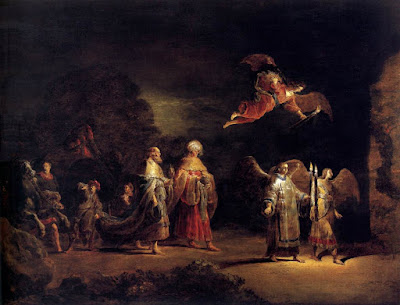"O sacrament of devotion! O sign of unity! O bond of
charity!" – St. Augustine
The Eucharist. It’s prevalent; it’s there, every day. It’s
the appearance of common foodstuffs—bread and wine. It’s so easy to take it for
granted. And yet, it’s the most radical belief of the faith—the living Christ,
resurrected and ascended, is still present on earth, today, now, in multiple
places all at once. It defies common understanding (that’s why it’s called a
mystery). In fact, many Christians, even Catholics, reject it, saying that the
elements of communion are merely a symbol. A symbol is easier to understand.
But the Church has always held that there is something more going on. As
Flannery O’Connor said, “If it’s just a symbol, then to hell with it.”
The catechism call the Eucharist is "the source and
summit of the Christian life” (CCC 1324). In fact, it goes on: “The other
sacraments, and indeed all ecclesiastical ministries and works of the
apostolate, are bound up with the Eucharist and are oriented toward it. For in
the blessed Eucharist is contained the whole spiritual good of the Church,
namely Christ himself.”
Now, the Eucharist is not just a symbol, but there is a lot
of symbolism. In the old testament, bread and wine were offered among the offering
of the first fruits; the first and best of the harvest were given to God in gratitude
for creation. When the Israelites escaped Egypt, they ate unleavened bread, and
then they continued to remember this liberation with the Passover meal, which
includes unleavened bread and wine, the cup of blessing representing the hope
of rebuilding Jerusalem. As they journeyed through the desert, God provided
manna, bread from heaven, to sustain them.
At the very beginning of his ministry, Jesus turns water
into wine so that people may continue their celebration at a wedding. It’s his first
public miracle. When Jesus’ preaching brought crowds, he multiped loaves and
fish to feed them all—so much that there was an abundance of leftover food.
So when he and disciples celebrate Passover, and he takes
the bread and the wine, there is already a rich symbolism there. But he is not
continuing the deep meaning of these elements; he is fulfilling them.
Sacrifice, thanksgiving, liberation, remembrance, sustenance, hope, celebration—he
is all that. He is everything. And he promises to always be that, for all people,
for all time.

The catechism acknowledges, “The Eucharist and the Cross are
stumbling blocks. It is the same mystery, and it never ceases to be an occasion
of division” (CCC 1336).
“The mode of Christ's presence under the
Eucharistic species is unique. It raises the Eucharist above all the sacraments
as the perfection of the spiritual life and the end to which all the sacraments
tend. In the most blessed sacrament of the Eucharist ‘the body and blood,
together with the soul and divinity, of our Lord Jesus Christ and,
therefore, the whole Christ is truly, really, and substantially
contained’ ” (CCC 1374).
It is a hard teaching. It is a powerful teaching. It is
an earth-shaking, world-changing reality. It’s so much easier to walk away or
brush it off as a symbol. As T. S. Eliot said, “Humankind cannot bear very much
reality.” Yet we are called to bear it. We are called to experience his
presence. We are called to eat his flesh and drink his blood, to go all-in, to
live in a radically altered world.








